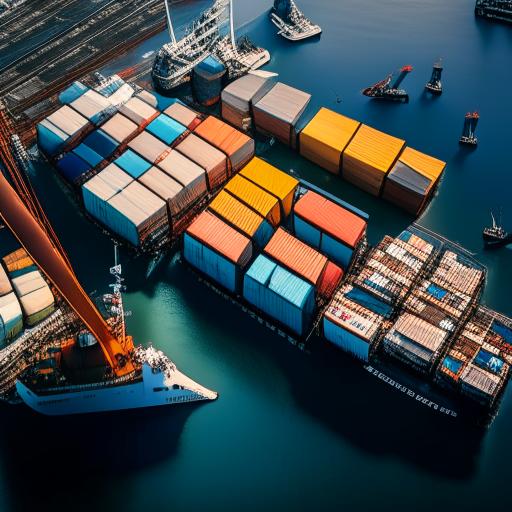Introduction
Global trade is the lifeblood of the modern world economy, as it facilitates the exchange of goods and services between countries. It not only enables nations to obtain resources that may not be readily available domestically, but also allows them to diversify, innovate, and grow economically. One critical aspect of global trade that often goes unnoticed is the vital role played by water transportation. From ancient civilizations to modern day commerce, the movement of goods via waterways has always been a cornerstone of international trade.
In this section, we will provide a brief overview of the importance of global trade, and delve into the significance of water transportation in facilitating and impacting global trade.
The Importance of Global Trade
Global trade has been a driving force behind economic growth and development throughout history. It promotes competition, leading to increased efficiency and innovation among businesses. By bringing together producers and consumers from different parts of the world, global trade expands the market for goods and services, accelerates technological advancements, and promotes cultural exchange. As countries are provided with the opportunity to specialize in the production of goods where they have a comparative advantage, global trade leads to an overall increase in the global production of goods and services.
The Significance of Water Transportation in Global Trade
Water transportation plays a crucial role in facilitating global trade. It provides the most cost-effective, energy-efficient, and environmentally friendly means of moving large volumes of goods over vast distances. Around 80% of all international trade by volume is transported via waterways, highlighting the importance of water transportation as the backbone of global trade.
The availability and accessibility of oceans, seas, rivers, and canals constitute a significant logistical advantage for water transportation, often making it the preferred mode of transportation for many industries. As global trade continues to grow, the demand for efficient and sustainable water transportation is expected to rise exponentially, making it a vital factor in the future growth and success of global commerce.
In the following sections, we will explore the various benefits of water transportation for global trade, its role in supply chain management, and the impact it has on small to medium sized eCommerce businesses.
II. Benefits of Water Transportation for Global Trade
Water transportation has been a significant facilitator of global trade throughout history. It is the preferred mode of transport when it comes to long-haul shipping of heavy goods, raw materials, and bulk commodities due to its many advantages. In this section, we will explore the key benefits of water transportation for global trade.
1. Cost Efficiency of Water Transportation
One of the primary reasons why water transportation remains a popular choice for global trade is its cost efficiency. Compared to other modes of transport like air, rail, or road, transporting goods via water is significantly cheaper. Ships are capable of carrying large quantities of cargo, which brings down the overall cost per unit. Additionally, water transportation isn't affected by traffic congestion or delays due to infrastructure, meaning it's a more consistent mode of transport in terms of cost and reliability.
2. Reduced Transportation Time
While water transportation might not be as fast as air transport, it does provide a more consistent and reliable delivery time. Unlike road and rail transport, sea routes are less susceptible to delays caused by weather, traffic, or natural disasters. Consequently, this reliability allows businesses to plan and manage their supply chains more effectively, ensuring that goods arrive at their intended destinations within the expected timeframes.
3. Ability to Transport Large Quantities of Goods
Water transportation offers the distinct advantage of being able to carry massive amounts of cargo at once. This is particularly significant in global trade, where large quantities of goods need to be transported over long distances. Ships can carry thousands of containers or bulk materials, ensuring that economies of scale are in-built into the transportation process. This high carrying capacity of ships not only reduces the cost per unit but also minimizes the overall environmental impact of transport.
4. Reduction in Carbon Footprint
With global warming and climate change becoming a growing concern, businesses are increasingly looking for ways to reduce their carbon footprint. Water transportation can help minimize the environmental impact of global trade by providing a more fuel-efficient mode of transport. Ships emit fewer greenhouse gas emissions per ton-kilometer compared to other transport modes, such as road or air transport. As a result, companies can lower their carbon footprint by choosing water transportation for their global trade.
5. Flexibility in Cargo Types
Water transportation offers unparalleled flexibility when it comes to the types of goods that can be shipped. From perishable items like fruits and vegetables to heavy machinery and automobiles, water transportation can handle a wide range of cargo sizes and types. This flexibility is crucial when it comes to global trade, where a diverse set of products and commodities needs to be transported across long distances. This versatility ensures that water transportation remains an indispensable element of any global trade operation.
6. Enhanced Security
Ships are less prone to theft and pilferage as compared to land-based modes of transport, like road and rail. Additionally, ports and shipping lines employ strict security measures and advanced technologies to prevent cargo theft or tampering. As a result, businesses can be more confident about the safety and security of their products when opting for water transportation.
7. Stimulating Economic Growth
Water transportation has a significant positive impact on economic growth. Efficient sea transport opens up new markets and trade opportunities, facilitating the flow of goods and services between countries and enhancing overall global connectivity. This increased economic activity promotes the growth of global logistics and supply chain management industries, generating employment opportunities and fostering economic development.
In conclusion, the benefits of water transportation for global trade are undeniable. Its cost efficiency, timely deliveries, high carrying capacity, reduced carbon footprint, flexible cargo handling, enhanced security, and economic stimulation make water transportation a crucial factor in the global trade landscape. By leveraging these benefits, businesses can optimize and expand their global operations while minimizing costs, promoting sustainability, and ensuring the security of their goods.
III. Role of Water Transportation in Supply Chain Management
A. Explanation of Supply Chain Management
Supply chain management (SCM) is the process of overseeing the flow of goods and services from the initial production stage to the final delivery stage. This includes product procurement, order fulfillment, inventory management, transportation, returns, and warehousing, as well as managing the relationships between suppliers, manufacturers, distributors, and retailers. Effective SCM allows businesses to minimize costs, improve efficiency, and meet customer demands in a timely manner.
B. Importance of Water Transportation in Supply Chain Management
Water transportation plays a vital role in an efficient and optimized supply chain. Here's why:
- Global Reach: Operating across international waters, water transportation connects businesses worldwide, making it possible to source raw materials from various regions and distribute products to markets in different continents.
- Transportation Mode Integration: Water transportation links with other modes of transportation, such as air, rail, and road. This integration helps create seamless multimodal transport routes, offering flexibility and economical alternatives for businesses to optimize their supply chains.
- Risk Management: Ensuring a constant supply of raw materials and timely delivery of products is crucial for businesses today. Water transportation allows for bulk transportation of goods, hence spreading the risk of supply disruptions or delays across larger volumes.
- Optimized Inventory Control: Importers and exporters can benefit from the scheduled nature of water transportation, which allows them to optimize their inventory levels, minimizing the need for excessive warehousing costs.
C. The Benefits of Using Water Transportation in Supply Chain Management
By incorporating water transportation into supply chain strategies, businesses can realize several benefits:
- Cost Savings: Shipping large volumes of goods via ocean can be significantly more cost-effective compared to other modes of transportation. Businesses can save on fuel, labor, and vehicle costs, freeing up resources to invest in other strategic areas.
- Scalability: The capacity of shipping vessels gives businesses the ability to scale their operations based on demand. The growing global population and consumer demand can be better served with water transportation that can accommodate higher volumes.
- Reduced Carbon Footprint: As green initiatives and eco-friendly practices become a priority for businesses, water transportation offers a more sustainable solution for moving goods compared to air and road transportation. Investing in environmentally responsible practices can give companies a competitive advantage.
- Reliability: As water transportation operates on a scheduled basis, predictable transit times make it easier for businesses to plan and strategize their supply chain processes, thereby improving overall efficiency.
D. Streamlining Supply Chain through Technological Advancements
The adoption and development of new technologies are helping make water transportation more efficient and streamlined within the supply chain. Innovations such as blockchain, automated container handling systems, advanced tracking systems, and data analytics are enhancing transparency, monitoring, and decision-making capabilities within the supply chain networks.
In conclusion, water transportation is an essential aspect of global supply chain management. By understanding its importance and leveraging it effectively, businesses can optimize their supply chain processes, leading to cost savings, enhanced efficiency, and a positive impact on the environment. In the increasingly interconnected global economy, water transportation continues to play a vital role in facilitating international trade and helping businesses grow.
The Impact of Water Transportation on Small to Medium Sized eCommerce Businesses
Understanding Small to Medium Sized eCommerce Businesses
Small to medium-sized eCommerce businesses are those that typically have a lesser annual revenue and number of employees in comparison to large enterprises. These businesses operate primarily online, selling products or services to customers across the globe. As the eCommerce industry rapidly grows, more and more SMEs are taking advantage of various logistics and transportation options to ensure the timely and cost-effective delivery of their goods.
The Significance of Water Transportation for eCommerce Businesses
For small to medium-sized eCommerce businesses, water transportation can be a pivotal component in their success. Ocean freight shipping plays a vital role in moving goods from one continent to another, making it possible for smaller enterprises to expand and reach customers in different countries. Not only does this open up global market opportunities, but it also fuels economic growth and development by opening new channels for small businesses to tap into larger consumer bases.
Reduced Operational Costs
One of the main advantages of water transportation for SMEs is its cost efficiency. Shipping goods via ocean freight is generally cheaper compared to other transportation methods like air freight. Especially for businesses that operate on tight budgets, keeping the costs low is crucial in maintaining profitability. Affordable shipping prices allow SMEs to pass on savings to their customers, making their products more competitive in the international market. How to Find Affordable Car Shipping Prices can provide more insight into ways to save on these costs.
Enhanced Shipping Capacity
Water transportation can facilitate the movement of large quantities of goods in a single shipment. Container ships are designed to carry thousands of tonnes of cargo, making them an ideal option for small businesses that want to transport bulk items. This is particularly beneficial for SMEs that deal in large volume orders or want to stockpile inventory to meet seasonal demands.
Shipping Time Advantages
Though water transportation can sometimes take longer than air freight, the advancements in the shipping industry and improvements to global supply chains have significantly reduced transit times. New shipping routes, more efficient vessels, and sophisticated logistical systems have made it possible for eCommerce businesses to expect their goods delivered within reasonable timeframes. Consequently, these reduced transit times help small businesses maintain customer satisfaction by minimizing delays in order fulfilment.
Improved Environmental Footprint
As eco-conscious business practices gain more traction, utilizing water transportation can help SMEs reduce their carbon footprint by choosing a more sustainable mode of transportation. Compared to air freight, ocean freight shipping has a lower greenhouse gas emission per unit of goods transported. By opting for environmentally friendly logistics solutions, SMEs show their commitment to sustainability and attract the increasing number of environmentally-conscious consumers.
Access to Broader Markets
Water transportation connects small eCommerce businesses to the global market, helping them reach customers and suppliers in different regions. As a result, these businesses can expand their product offerings, source materials from diverse locations, and access untapped markets. This can substantially boost their growth and revenue while promoting global trade relations.
Conclusion
In summary, water transportation plays a significant role in the success of small to medium-sized eCommerce businesses by providing cost-efficient, timely, and eco-friendly shipping solutions. Its ability to transport large quantities of goods across continents enables SMEs to expand their market reach and fuel economic growth. Furthermore, as global trade continues to evolve, the importance of water transportation is set to remain indispensable for businesses of all sizes. By embracing the benefits of this shipping method, SMEs can thrive in the increasingly competitive eCommerce space.
V. The Impact of Water Transportation on Small to Medium Sized eCommerce Businesses
A. Understanding Small to Medium Sized eCommerce Businesses
Before diving into the role of water transportation in shaping small to medium-sized eCommerce businesses, it's crucial to first define the term. In general, these businesses typically operate online and have a customer base comprising local, regional, and international clients. Their annual revenue, size, and transaction volume may vary, but they predominantly cater to niche markets and maintain a lean operation.
B. The Significance of Water Transportation for eCommerce Businesses
With the rapid growth of eCommerce, the transportation of goods has become increasingly important. For businesses of any size, shipping can make or break customer satisfaction and potentially affect the overall success of the company. Small to medium-sized eCommerce businesses, in particular, can immensely benefit from water transportation in various ways.
Efficiency and Cost Savings
Water transportation often offers more competitive pricing compared to air or road travel, making it an attractive option for businesses looking to save on logistics costs. For eCommerce companies with thin profit margins, using water transportation even for short distances can significantly impact their financial performance.
Access to International Markets
Another essential advantage of water transportation is the ability to tap into global markets. Unlike land-based transportation, which is limited by geographical boundaries, water transportation allows businesses to easily reach markets in other continents. By utilizing water transportation options, small to medium-sized eCommerce businesses can expand their reach and potentially increase their sales.
Bulk Shipping Capabilities
Water transportation enables the movement of large quantities of goods, especially in the form of containerized cargo. Taking advantage of this feature allows eCommerce businesses to import or export goods at scale, thereby reducing the overall cost per unit and increasing profit margins. This is especially beneficial for businesses dealing with high-volume products.
C. Advantages of Using Water Transportation for eCommerce Businesses
Small to medium-sized eCommerce businesses can amplify their competitiveness and meet the ever-growing market demands by incorporating water transportation into their logistics strategy. Below, we've listed some key benefits of utilizing water transportation:
Streamlined and Predictable Shipping Processes
In comparison to other modes of transport, water transportation is generally less affected by sudden changes in weather conditions, congestion, or customs regulations. This results in a more predictable and reliable shipping process, which ultimately benefits eCommerce businesses in terms of maintaining customer satisfaction.
Environmental Sustainability
As eCommerce businesses grow more conscious of their environmental impact, water transportation can help them meet their sustainability goals. Shipping goods via waterways typically has a lower carbon footprint compared to air or road travel. Therefore, adopting water transportation can reduce a business's overall environmental impact and, as a result, appeal to more eco-conscious customers.
Integration with Global Logistics Networks
Water transportation is an integral part of most global logistics networks and can easily be integrated with other means of transport, like road and rail travel. This multi-modal approach allows eCommerce businesses to improve their supply chain efficiency and reduce potential bottlenecks in delivery.
D. The Future of Water Transportation in eCommerce
The rise of eCommerce and increased customer demand for fast, efficient, and sustainable delivery has put water transportation at the forefront of the logistics industry. As technological advancements continue to automate and streamline various aspects of the shipping process, small to medium-sized eCommerce businesses can expect to benefit even more from water transportation.
In conclusion, water transportation plays a significant role in the success of small to medium-sized eCommerce businesses. The cost-efficiency, bulk shipping capabilities, and access to international markets make this mode of transport essential to achieving competitiveness and expansion in an ever-evolving global landscape. As eCommerce continues to shape the trajectory of global trade, the importance of water transportation will only continue to grow.
<h2>Frequently Asked Questions</h2>
<h3>1. Why is water transportation essential for global trade?</h3>
<p>Water transportation plays a crucial role in global trade due to its cost efficiency, reduced transportation time, ability to transport large quantities of goods, and reduction in carbon footprint. Overall, it helps foster international partnerships and business growth.</p>
<h3>2. How does water transportation contribute to supply chain management?</h3>
<p>In supply chain management, water transportation ensures a seamless flow of goods from production to consumers. It helps maintain a cost-effective and flexible supply chain, which can lead to improved customer satisfaction, increased profitability, and better overall performance for businesses.</p>
<h3>3. How can small to medium sized eCommerce businesses benefit from water transportation?</h3>
<p>Water transportation enables eCommerce businesses to reduce shipping costs, transport large volumes of goods, and expand their reach to international markets. It also provides a competitive advantage, allowing businesses to offer better shipping rates to their customers.</p>
<h3>4. Is water transportation more environmentally friendly compared to other modes of transportation?</h3>
<p>Yes, water transportation has a lower carbon footprint compared to air, road, and rail transportation due to the ability to move large quantities of goods with less fuel consumption. This helps businesses to create a more sustainable supply chain and reduce their environmental impact.</p>
<h3>5. Can water transportation impact a business’s delivery time?</h3>
<p>While water transportation can sometimes result in longer transit times compared to air shipment, it offers a balance between cost and time efficiency. By planning the supply chain effectively and incorporating ocean shipping, businesses can ensure their delivery timelines are met without incurring excessive costs.</p>
<script type=”application/ld+json”>
{
“@context”: “https://schema.org”,
“@type”: “FAQPage”,
“mainEntity”: [
{
“@type”: “Question”,
“name”: “Why is water transportation essential for global trade?”,
“acceptedAnswer”: {
“@type”: “Answer”,
“text”: “Water transportation plays a crucial role in global trade due to its cost efficiency, reduced transportation time, ability to transport large quantities of goods, and reduction in carbon footprint. Overall, it helps foster international partnerships and business growth.”
}
},
{
“@type”: “Question”,
“name”: “How does water transportation contribute to supply chain management?”,
“acceptedAnswer”: {
“@type”: “Answer”,
“text”: “In supply chain management, water transportation ensures a seamless flow of goods from production to consumers. It helps maintain a cost-effective and flexible supply chain, which can lead to improved customer satisfaction, increased profitability, and better overall performance for businesses.”
}
},
{
“@type”: “Question”,
“name”: “How can small to medium sized eCommerce businesses benefit from water transportation?”,
“acceptedAnswer”: {
“@type”: “Answer”,
“text”: “Water transportation enables eCommerce businesses to reduce shipping costs, transport large volumes of goods, and expand their reach to international markets. It also provides a competitive advantage, allowing businesses to offer better shipping rates to their customers.”
}
},
{
“@type”: “Question”,
“name”: “Is water transportation more environmentally friendly compared to other modes of transportation?”,
“acceptedAnswer”: {
“@type”: “Answer”,
“text”: “Yes, water transportation has a lower carbon footprint compared to air, road, and rail transportation due to the ability to move large quantities of goods with less fuel consumption. This helps businesses to create a more sustainable supply chain and reduce their environmental impact.”
}
},
{
“@type”: “Question”,
“name”: “Can water transportation impact a business’s delivery time?”,
“acceptedAnswer”: {
“@type”: “Answer”,
“text”: “While water transportation can sometimes result in longer transit times compared to air shipment, it offers a balance between cost and time efficiency. By planning the supply chain effectively and incorporating ocean shipping, businesses can ensure their delivery timelines are met without incurring excessive costs.”
}
}
]
}
</script>







